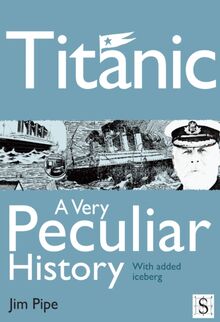Titanic, A Very Peculiar History , livre ebook
68
pages
English
Ebooks
2011
Vous pourrez modifier la taille du texte de cet ouvrage
Obtenez un accès à la bibliothèque pour le consulter en ligne En savoir plus
Découvre YouScribe en t'inscrivant gratuitement
Découvre YouScribe en t'inscrivant gratuitement
68
pages
English
Ebooks
2011
Vous pourrez modifier la taille du texte de cet ouvrage
Obtenez un accès à la bibliothèque pour le consulter en ligne En savoir plus
Publié par
Date de parution
07 décembre 2011
Nombre de lectures
4
EAN13
9781908759207
Langue
English
Publié par
Date de parution
07 décembre 2011
Nombre de lectures
4
EAN13
9781908759207
Langue
English
Title Page
TITANIC, A VERY PECULIAR HISTORY
With added iceberg
Written by
Jim Pipe
Created and designed by David Salariya
Publisher Information
First published in Great Britain in MMXI by Book House, an imprint of
The Salariya Book Company Ltd
25 Marlborough Place, Brighton BN1 1UB
www.salariya.com
www.book-house.co.uk
Digital edition converted and distributed in 2011 by
Andrews UK Limited
www.andrewsuk.com
Editors: Stephen Haynes, Jamie Pitman
Assistant editor: Jodie Leyman
Illustrated by David Antram
Additional artwork: Mark Bergin, Bill Donohoe
© The Salariya Book Company Ltd MMXI
All rights reserved. No part of this publication may be reproduced, stored in or introduced into a retrieval system or transmitted in any form, or by any means (electronic, mechanical, photocopying, recording or otherwise) without the written permission of the publisher. Any person who does any unauthorised act in relation to this publication may be liable to criminal prosecution and civil claims for damages.
Every effort has been made to trace copyright holders. The Salariya Book Company apologises for any omissions and would be pleased, in such cases, to add an acknowledgement in future editions.
Visit our website at
www.book-house.co.uk
or go to
www.salariya.com
for free electronic versions of:
You Wouldn’t Want to be an Egyptian Mummy!
You Wouldn’t Want to be a Roman Gladiator!
You Wouldnt Want to Join Shackleton’s Polar Expedition!
You Wouldn’t Want to Sail on a 19th-Century Whaling Ship!
Dedication
For my father, who shares his love of stormy seas with anyone brave enough to sail with him.
JP
Quotes
‘We have arrived at a new time – and with this new time, strange methods, huge forces and combinations – a Titanic world – have spread all around us.’
Winston Churchill, speaking in 1909
‘The science of shipbuilding has now reached a degree of perfection [that] has not only robbed the sea of its terrors, but has imposed upon its unstable surface comforts, and even luxuries, of travel surpassing anything on land.’
Belfast News-Letter, 21 October 1910
‘I cannot imagine any condition which would cause a modern ship to founder… Shipbuilding has gone beyond that…’
Captain Edward Smith, six years before the maiden voyage of the Titanic
‘To call this ship unsinkable is flying in the face of God!’
Mrs Esther Hart , passenger
Sent to Davy Jones’s Locker
The story that is about to unfold may be the most famous maritime disaster in history, but it’s just one of a long list of horrifying incidents. When things go wrong at sea, they go very badly wrong. No wonder sailors of old believed in Davy Jones, a demon who rules over the evil spirits of the deep…
•Bad navigation
On the night of 22 October 1707, a Royal Navy fleet returning from Gibraltar to Portsmouth sailed through dangerous reefs off the Isles of Scilly. Four ships – HMS Association, Eagle, Romney and Firebrand – sank, and over 1,500 sailors died, their bodies washing up on shore for days afterward. An investigation found that the main reason for the disaster was navigational error, and a prize was set up to find a better way to calculate longitude (a ship’s east–west position). It was won in 1765 by Yorkshire clockmaker John Harrison.
•Short cut
Bound for Jakarta in Indonesia, the Tek Sing left the port of Amoy (now Xiamen in Fujian, China) packed with porcelain and Chinese emigrants. A month into the voyage, the captain, Io Tauko, decided to chance a short cut through the Gaspar Strait. On 6 February 1822 the Tek Sing struck a reef and sank within the hour, in about 30 metres of water. Around 1,600 people went down with the ship.
•Fire
On 15 June 1904 the paddle-steamer General Slocum caught fire in New York’s East River. All told, more than 1,000 people died – mostly women and children on their way to a picnic – making it New York’s worst disaster until the 9/11 attacks in 2001. It was later found that the firm that made the lifejackets had filled them with cheap, useless material instead of cork, then added iron bars to make them the correct weight! Anyone who strapped on one of these jackets and jumped into the water quickly sank to the bottom.
•Typhoon
The Japanese steamship SS Kiche Maru sank during a typhoon in the Pacific Ocean on 22 September 1912. More than 1,000 people lost their lives. As there were no survivors, very little is known about what actually happened. The storm sank hundreds of vessels and devastated the ports of Osaka and Nagoya.
•Torpedoed
The liner RMS Lusitania was torpedoed without warning by a German U-boat (submarine) on 7 May 1915 and sank in 18 minutes off the southwest coast of Ireland. Two explosions rocked the ship. The first was caused by the torpedo, but a second, much larger explosion has never been fully explained – was the Lusitania secretly carrying armaments? An estimated 1,198 people died, including 139 US citizens, and the attack eventually led to the United States declaring war on Germany.
•Fog
The French steamer La Bourgogne sank on 4 July 1898 after the British sailing ship Cromartyshire accidentally rammed her in dense fog off Cape Sable, Nova Scotia; 565 lives were lost. Survivors described brutal scenes as the crew of the French ship grabbed all available lifeboats and rafts. Panic broke out, passengers using knives and revolvers in a mad rush to recapture the lifeboats.
•Snow
On 24 March 1878 the training vessel HMS Eurydice was caught in a heavy snowstorm off the Isle of Wight. The sailing ship capsized and sank, and those who survived the sinking soon froze to death in the icy waters. Just two of the ship’s 366 crew and trainees survived.
•Overloading
The paddle-steamer Brother Jonathan sank off Crescent City, California on 30 July 1865. Even before passengers got on, the captain had noticed the ship lying dangerously low in the water, but kept schtum after being threatened with the sack. Dock hands then loaded a giant ore crusher onto a part of the hull that had only just been patched up. Encountering stormy weather, the captain headed for safety. The ship had almost made it to port when a large wave drove it onto an uncharted rock, ripping a huge hole in the hull. Soon after, the ore crusher crashed through the weakened hull. A single lifeboat escaped carrying 19 people, but 225 others died in the wreck.
•Burst boiler
In April 1865 the American Civil War had just ended, and the Mississippi riverboat SS Sultana was carrying thousands of former Union prisoners of war back north. At about 2.00 a.m. on the 27th the boilers exploded, breaking the ship in half. The explosion killed many passengers and threw others hundreds of feet into the water. A few survivors were plucked from trees along the riverbank, but many of the soldiers couldn’t swim, and an estimated 1,500–1,900 people died.
•Sharks, salt and thirst
On 30 July 1945 the USS Indianapolis was torpedoed by a Japanese submarine and sank in 12 minutes. Around 300 crew members went down with the ship. The remaining 880 floated in the water, waiting for help. But the US Navy did not know about the sinking for another four days. By then, hundreds more had died from cold, lack of food and water, salt poisoning and shark attacks. Only 317 survived out of 1,196 crew – the greatest single loss of life at sea in the history of the US Navy.
•Collision
Sailing from Samar Island in the Philippines to the capital, Manila, the passenger ferry MV Doña Paz collided with a tanker carrying 8,800 barrels of oil products on 20 December 1987. A giant ball of fire immediately engulfed both ships. The Doña Paz sank within two minutes and over 4,380 people died – the greatest loss from a single ship in peacetime.
Introduction
A perilous journey
A hundred years ago there were no jumbo jets to whisk you around the world. If you wanted to travel between Europe and America there was only one way – by sea.
During the 19th century it took sailing ships weeks, if not months, to complete the often hazardous crossing of the vast Atlantic Ocean. Many vessels were small, cramped and uncomfortable, and both passengers and crew suffered horribly.
If, like me, you’re the sort of person who gets seasick sitting in a rubber dinghy, just imagine what it was like being tossed around by stormy seas for weeks on end. At the beginning of the voyage there was usually a desperate scramble to get one of the top bunks – to avoid a veritable Niagara of vomit from the seasick passengers above. Home comforts? Forget it! Many ships carrying livestock were simply hosed out for the return trip with immigrant traffic, earning them the nickname ‘cattle boats’.
Though terrifying tempests are two a penny on the Atlantic, safety wasn’t a major concern for shipowners and many vessels were lost without trace. Yet despite the horrors at sea, countless thousands of Europeans were willing to risk the journey to begin a new life in America. Some were escaping from poverty, religious persecution or war. Others simply hoped for a more prosperous life in fast-growing US cities such as New York. The stampede to find gold in California in 1849 and northern Canada in 1896 also lured thousands hoping to strike it lucky.
The ‘bowl of tears’
From the mid-1840s onwards, over a million people fled














